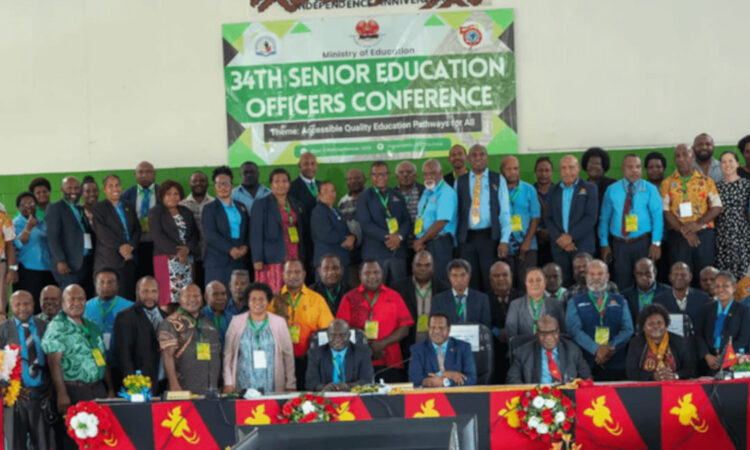The outcomes from the 34th Senior Education Officers Conference (SEOC), held in the Northern Province under the theme “Accessible Education Pathways for All,” have now been released. This gathering brought together over 100 Senior Education Officers, Provincial Education Advisors, development partners, and stakeholders to tackle key challenges and chart the future of education in Papua New Guinea.
The conference resulted in a series of resolutions aimed at transforming the education system. These decisions focus on enhancing teacher professionalism, expanding educational pathways, and promoting inclusive and technology-driven learning. Below is a breakdown of the key resolutions that must be implemented across the system.
Teacher Profession and Welfare
- The conference resolved to elevate the teaching profession, making it more prestigious and appealing to the nation’s top talents.
- Teacher welfare is a top priority, with housing becoming a mandatory requirement for school registration and integrated into employment conditions.
- SEOC endorsed teacher licensing to maintain high professional standards and approved measures for the re-admission of teachers who have resigned.
- Teacher salaries and benefits will be streamlined by integrating the E-RODSS system with the Alesco payroll by 2026.
Education Pathways: FODE, TVET, and Skills Training
- SEOC reaffirmed Flexible, Open and Distance Education (FODE) and Technical and Vocational Education and Training (TVET) as essential pathways to ensure no child is left behind.
- Provinces will establish FODE centers in every Local-Level Government (LLG), supported by secondary schools and vocational institutions.
- Industries will be consulted to align training programs with labor market needs and employment opportunities.
- A National TVET Strategic Management Plan will be developed with input from provinces before its launch later this year.
Curriculum and Student Development
- The phasing out of Elementary Schools will continue, integrating Prep to Grade 2 into primary schools. Teachers will receive retraining to meet the new requirements.
- Selections into Grades 9 and 11 will be gradually phased out between 2025 and 2027, allowing all students to complete 13 years of basic education.
- Early Childhood Education (ECE) will be fully rolled out in registered schools as part of the National Education Plan.
Special and Inclusive Education
- SEOC endorsed a new approach to student welfare, including the establishment of inclusive education institutions with government support.
- Compulsory hearing and sight tests will be implemented for preparatory students, alongside broader awareness campaigns on inclusive education policies.
Technology and ICT in Education
- Provinces will support the Learning Management System (LMS) to enhance access to digital learning.
- The Teaching Service Commission will create dedicated ICT teacher positions in schools.
- The Government will negotiate for more affordable internet connectivity, including through services like Starlink.
Partnerships and Collaboration
- SEOC emphasized the importance of strengthening ties with development partners, NGOs, and organizations such as UNESCO, the Kokoda Track Foundation, and Save the Children to bolster education reforms.
- The University of Goroka will align STEM curriculum content and collaborate with Teacher Colleges to elevate the quality of teacher training.
Future SEOC Hosting
Minister for Education Lucas Dekena praised the conference outcomes, stating that they reaffirm a collective commitment to accessible, quality, and inclusive education for every Papua New Guinean child. “These decisions set the foundation for reforms in teacher professionalism, student pathways, and education delivery across all levels,” he said.
“I thank all provincial education authorities, partners, and stakeholders for their invaluable contributions. Together, we will deliver on the Government’s vision of 13 years of quality education for all,” Minister Dekena added.
This conference marks a significant step forward in Papua New Guinea’s education landscape, ensuring that reforms are inclusive, practical, and forward-thinking. Stay tuned for updates on the implementation of these resolutions.


One comment
Comments are closed.